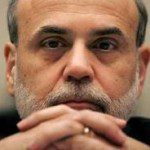U.S. Federal Reserve Chair Bernanke addressed the Joint Economic Committee of  the U.S. Congress on The Economic Outlook [saying in a nutshell] “We clearly understand the game we are playing, but we are boxed in and have to stay with our current strategy. We hope for the best because we are out of options”.
the U.S. Congress on The Economic Outlook [saying in a nutshell] “We clearly understand the game we are playing, but we are boxed in and have to stay with our current strategy. We hope for the best because we are out of options”.
By Ian R. Campbell
(NOTE: This post is presented by Lorimer Wilson, editor of www.munKNEE.com and the free Intelligence Report newsletter (see sample here). The article may have been edited ([ ]), abridged (…) and/or reformatted (some sub-titles and bold/italics emphases) for the sake of clarity and brevity to ensure a fast and easy read.
Bernanke spoke about:
- the Federal Reserve being “aware that a long period of low interest rates has costs and risks”, which costs he identified as the low income returns ‘savers’ currently are generating from “savings accounts and government bonds”;
- the risk (which Mr. Bernanke described as a “cost”), which he specifically said is “one that we take very seriously”, that if very low interest rates persist for “too long” (which he didn’t define) that “could undermine financial stability”, where “for example, investors or portfolio managers dissatisfied with low returns may ‘reach for yield’ by taking on more credit risk, duration risk, or leverage”;
- “recognizing the drawbacks of persistently low (interest) rates, the Federal Reserve’s ‘Open Market Committee’ “actively seeks economic conditions consistent with sustainably higher interest rates”;
- however, ‘unfortunately’ if the Federal Reserve were now to withdrew its current monetary (quantitative) easing policies while interest rates might “rise temporarily”, that “would also carry a substantial risk of slowing or ending the economic recovery and causing inflation to fall further” (i.e. read ‘lead to recession or depression’; and,
- the “best way to achieve higher returns in the medium term (undefined) and beyond is for the Federal Reserve – consistent with its congressional mandate – to provide policy accommodation as needed to foster maximum (U.S.) employment and price stability”.
Other things in Mr. Bernanke’s address I found of interest are:
- his statements on the U.S. unemployment rate, in particular his reference to a continued ‘weak job market’ and his specific reference to “nearly 8 million (Americans who) are working part-time when they would prefer full-time work. All too often jobs are reported in the U.S. and other countries as if ‘a job’ is ‘a job’ is ‘a job’, without reference to job quality or pay scale;
- his statement that “since last summer, financial conditions in the euro area have improved somewhat”. I am unsure of his basis for that conclusion, as he didn’t explain his reasoning. From my perspective, given what has developed since last summer in France, Italy, Portugal, and Spain – and throw in Cyprus, Slovenia, and ongoing recession in the eurozone – Mr. Bernanke’s statement doesn’t make sense to me; and,
- his statement with respect to U.S. 2013 prospective GDP growth, specifically in the contexts of (among other things) the recent ending of the payroll tax cut, tax increases, and the so-called sequester. Collectively, Mr. Bernanke said these things are expected to reduce 2013 GDP growth by 1.5% from what it otherwise might be. I think importantly, Mr. Bernanke then said: “in present circumstances, with short-term interest rates already close to zero, monetary policy does not have the capacity to fully offset an economic headwind of this magnitude”.
With respect to the last point, you may recall that I commented on the ‘coming in force’ of the ‘sequester’ on March 2 which cut U.S. federal government spending by $85 billion per year – see U.S.: Sequester and negative economics. In that commentary I said:
“To be clear, the point I was (and am) making is:
- in the overall scheme of America’s national debt and deficits, $85 billion per year is rather immaterial;
- if one accepts $85 billion to be immaterial in a U.S. federal accounts context, the forecasted impact of the sequester cuts in a the next seven months on GDP (0.5% decline) is material, and lost jobs (400,000 – 750,000) are significant; and,
- consider the negative impact on America’s economy if this year’s U.S. pre-sequester federal budgeted spend of $3.8 trillion was cut by $300 billion instead of by only $85 billion. Query: How much more would the negative leverage on U.S. economic performance then be, and would a $300 billion U.S. federal spending reduction result in an exponential negative economic impact?
Interestingly, I have seen no report or comment on what the resultant U.S. federal deficit is expected to be for fiscal 2013 following sequester cuts. If U.S. GDP indeed drops by 0.5% as a result of the sequester cuts, I would expect U.S. federal government revenues to fall from pre-sequester forecasts. If that is right, and I think it has to be, then what was forecast to be a $900 billion 2013 U.S. federal deficit will be more than the result derived by deducting the $85 billion in sequester cuts from the previously forecast $900 billion 2013 federal deficit ($815 billion).”
Mr. Bernanke’s comment yesterday reminded me of what I had pointed out on March 2…I believe this is something that economists and commentators ought to actively research, and that those who invest in the financial markets ought to think hard about.
We live in interesting, and I think troublesome, times.
(Editor’s Note: The author’s views and conclusions in the above article are unaltered and no personal comments have been included to maintain the integrity of the original post. Furthermore, the views, conclusions and any recommendations offered in this article are not to be construed as an endorsement of such by the editor.)
1. Can Bank Deposit Confiscation Happen Here?
The following is a ‘to be forewarned is to be forearmed’ commentary. Should those with bank deposits in the…European Union be concerned about the possibility of a ‘Cyprus event’ coming ‘soon to their neighbourhood’?…What about bank deposit confiscation in Canada?…[T]his is something to…consider and ‘think about’. Read More »
Without economic growth, and real economic growth at that, there can be no meaningful long-term economic recovery in the developed countries. Growth or lack thereof will have to be reflected in the financial markets over time. Currently, I continue to see a disconnect between where the financial markets are pricing things, and where I think they ought to be pricing things. Words: 784
3. “Ponzi Finance”: What Must Happen To Bring It To An End?
4. Don’t Blithely Accept the Views of Stock & Commodity Commentators – Here’s Why
< p>< noscript>
< p>< noscript>
6. Campbell’s Challenge: Stop Being a Lemming! Contradictory Points of View are Imperative – Here’s Why
< p>< noscript>
< p>< noscript>
7. Campbell: Balanced Opinions Regarding Gold & Silver are Paramount – Here’s Why
 munKNEE.com Your Key to Making Money
munKNEE.com Your Key to Making Money
